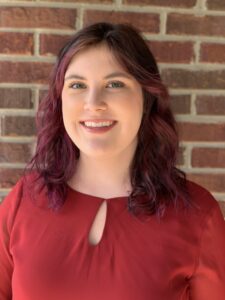
Mia Kochanek, Junior, Major: Human Biology
The global pandemic did not deter third-year Michigan State University and Lyman Briggs College student Mia Kochanek from continuing her professional development. Majoring in Human Biology, Kochanek completed both online and in-person training to become a certified phlebotomist. Today she is working in a hospital where she supports patients by taking blood samples and preparing them for testing.
Kochanek utilized her personal network to learn about her current job. She applied for the position after hearing from a family member that the hospital was hiring for a phlebotomist. Kochanek was invited to interview for the role and eventually offered the position.
Working in a hospital, Kochanek has specific responsibilities that are vital to patient health. As a phlebotomist, she is chiefly responsible for drawing blood. In that process, she has to ensure she is fulfilling the correct order and properly identifying all of her patients and their samples. Additionally, Kochanek provides general patient support to the nursing staff during her shifts, when needed.
This experience has been integral to developing her patient interaction skills. “No one is happy to have their blood drawn,” Kochanek said, explaining, “You have to be polite and comforting.” The necessity for these skills has only been exacerbated during the pandemic, with patient restrictions that bar visitors. Kochanek says she has learned to mentally prepare and cope with the fear and uncertainty of interacting with COVID-19 patients while providing comfort care to those who cannot see their families.
Her work has certainly presented her with challenges, and she credits several MSU organizations with preparing her. A membership in the Pre-Physician Assistant (PA) Club set her on the path of phlebotomy and medical assistantship, providing her with knowledge and resources about the opportunities available to her. In addition, her group coursework in Lyman Briggs has taught her how to interact with different personalities, resolve conflicting opinions, and has expanded her interpersonal skills. Combined, these experiences helped prepare her for her hospital work.
Kochanek would advise her fellow Spartans to “not give up and be adaptable,” especially during the pandemic. “Be willing to change your path,” she said. A year ago, she could not have imagined working in phlebotomy but adapted her plans as new opportunities arose.
Upon graduation, Kochanek plans to take a gap year to study for the GRE and strengthen her graduate school and professional applications before pursuing a career as a Physician Assistant.


